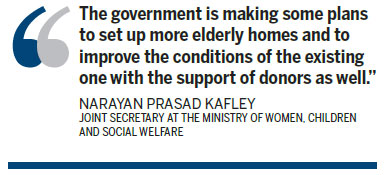Nepal's elderly call on government to provide better facilities
On the eve of the World Elder Abuse Awareness Day which fell on Sunday, Nepal's elderly or abandoned parents asked the government to provide them with better facilities.
The Pashupati Briddhashram Elderly Home that shelters 230 senior citizens is the only government-run elderly home in Nepal.
Located at the Pashupatinath Temple, a UNESCO World Heritage Site, the establishment was built in 1882 to feed Hindu pilgrims, but since 1977 the Ministry of Women, Children and Social Welfare has used the building as a home for the elderly.
Many of the elderly citizens complained about the unfriendly infrastructure and the lack of amenities at the home for the elderly. But for most the choice is between the streets and a place to stay, however inconvenient it is.
Shanta Kumari Upreti, who has lived at the home for the past six years, said that the government should think of people like him and provide them with amenities since they have only few years to live.
And just being able to qualify to live in the home for the elderly is not easy. The elderly should be more than 65 years old; they should own no property in Nepal and should prove that they receive no family care.
Because of such strict criteria, just a small percentage of Nepalese senior citizens in need of a shelter get a place to stay and thus many are forced to live on the sidewalk or in abandoned buildings.
Some of the elderly are victims of domestic violence in the hands of their extended families. Elderly women in particular are forced out of their homes after their children get married, especially when the husband does not want to be burdened by another mouth to feed.
"Nepal is a developing country and resources are limited. The government is making some plans to set up more elderly homes and to improve the conditions of the existing one with the support of donors as well," said Narayan Prasad Kafley, joint secretary at the Ministry of Women, Children and Social Welfare.
Agreement reached

Kafley added that the ministry has proposed hiking allowances given to elderly people in the budget for the next fiscal year. The move is aimed at appeasing senior citizens, who have been organizing protests for the past 15 months.
"Last week, we reached an agreement with the senior citizens' struggle committee; the government will provide subsidies to elders in different areas such as for access to transportation and healthcare, but this is unlikely to happen in the blink of an eye," Kafley said.
The senior citizens' struggle committee, which has been leading the protests, has demanded a minimum elderly monthly allowance of 3,000 Nepali Rupees ($31), 50 percent subsidy on transport fares and guarantee of equal rights for the elderly in the new constitution, among other things.
Since 1994, the government has been providing 500 Nepali Rupees as a monthly allowance to people above 70 years of age.
In Nepal, with the traditional family norms that value and respect the elderly slowly eroding, senior citizens often feel neglected by their families. The trend of youngsters migrating abroad in search of greener pastures means that old parents are often left behind with no one to look after them.
"In the past children would take care of their parents, they thought it was their responsibility. But societal changes created a situation where elderly people receive less attention," said Manoj Kumar Basnet, office chief at the home for the aged.
The World Health Organization estimates that about 4 to 6 percent of older people worldwide suffer from a form of abuse. But in Nepal, the government does not have reliable data on the extent of abuse against senior citizens.
(China Daily 06/17/2014 page10)














